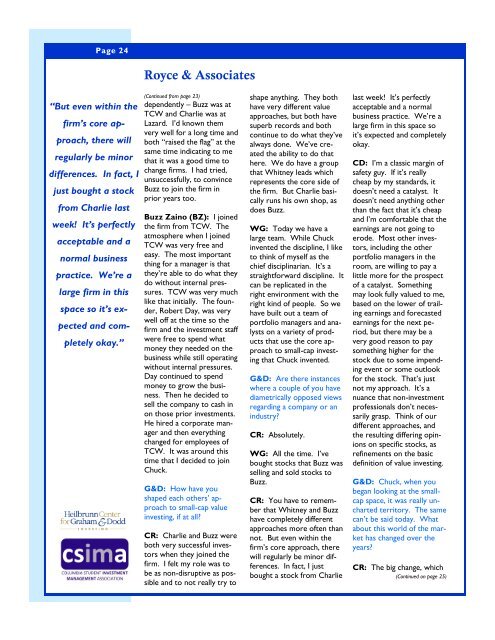Graham & Doddsville - Columbia Business School
Graham & Doddsville - Columbia Business School
Graham & Doddsville - Columbia Business School
Create successful ePaper yourself
Turn your PDF publications into a flip-book with our unique Google optimized e-Paper software.
Page 24<br />
“But even within the<br />
firm’s core ap-<br />
proach, there will<br />
regularly be minor<br />
differences. In fact, I<br />
just bought a stock<br />
from Charlie last<br />
week! It’s perfectly<br />
acceptable and a<br />
normal business<br />
practice. We’re a<br />
large firm in this<br />
space so it’s ex-<br />
pected and com-<br />
pletely okay.”<br />
Royce & Associates<br />
(Continued from page 23)<br />
dependently – Buzz was at<br />
TCW and Charlie was at<br />
Lazard. I’d known them<br />
very well for a long time and<br />
both “raised the flag” at the<br />
same time indicating to me<br />
that it was a good time to<br />
change firms. I had tried,<br />
unsuccessfully, to convince<br />
Buzz to join the firm in<br />
prior years too.<br />
Buzz Zaino (BZ): I joined<br />
the firm from TCW. The<br />
atmosphere when I joined<br />
TCW was very free and<br />
easy. The most important<br />
thing for a manager is that<br />
they’re able to do what they<br />
do without internal pressures.<br />
TCW was very much<br />
like that initially. The founder,<br />
Robert Day, was very<br />
well off at the time so the<br />
firm and the investment staff<br />
were free to spend what<br />
money they needed on the<br />
business while still operating<br />
without internal pressures.<br />
Day continued to spend<br />
money to grow the business.<br />
Then he decided to<br />
sell the company to cash in<br />
on those prior investments.<br />
He hired a corporate manager<br />
and then everything<br />
changed for employees of<br />
TCW. It was around this<br />
time that I decided to join<br />
Chuck.<br />
G&D: How have you<br />
shaped each others’ approach<br />
to small-cap value<br />
investing, if at all?<br />
CR: Charlie and Buzz were<br />
both very successful investors<br />
when they joined the<br />
firm. I felt my role was to<br />
be as non-disruptive as possible<br />
and to not really try to<br />
shape anything. They both<br />
have very different value<br />
approaches, but both have<br />
superb records and both<br />
continue to do what they’ve<br />
always done. We’ve created<br />
the ability to do that<br />
here. We do have a group<br />
that Whitney leads which<br />
represents the core side of<br />
the firm. But Charlie basically<br />
runs his own shop, as<br />
does Buzz.<br />
WG: Today we have a<br />
large team. While Chuck<br />
invented the discipline, I like<br />
to think of myself as the<br />
chief disciplinarian. It’s a<br />
straightforward discipline. It<br />
can be replicated in the<br />
right environment with the<br />
right kind of people. So we<br />
have built out a team of<br />
portfolio managers and analysts<br />
on a variety of products<br />
that use the core approach<br />
to small-cap investing<br />
that Chuck invented.<br />
G&D: Are there instances<br />
where a couple of you have<br />
diametrically opposed views<br />
regarding a company or an<br />
industry?<br />
CR: Absolutely.<br />
WG: All the time. I’ve<br />
bought stocks that Buzz was<br />
selling and sold stocks to<br />
Buzz.<br />
CR: You have to remember<br />
that Whitney and Buzz<br />
have completely different<br />
approaches more often than<br />
not. But even within the<br />
firm’s core approach, there<br />
will regularly be minor differences.<br />
In fact, I just<br />
bought a stock from Charlie<br />
last week! It’s perfectly<br />
acceptable and a normal<br />
business practice. We’re a<br />
large firm in this space so<br />
it’s expected and completely<br />
okay.<br />
CD: I’m a classic margin of<br />
safety guy. If it’s really<br />
cheap by my standards, it<br />
doesn’t need a catalyst. It<br />
doesn’t need anything other<br />
than the fact that it’s cheap<br />
and I’m comfortable that the<br />
earnings are not going to<br />
erode. Most other investors,<br />
including the other<br />
portfolio managers in the<br />
room, are willing to pay a<br />
little more for the prospect<br />
of a catalyst. Something<br />
may look fully valued to me,<br />
based on the lower of trailing<br />
earnings and forecasted<br />
earnings for the next period,<br />
but there may be a<br />
very good reason to pay<br />
something higher for the<br />
stock due to some impending<br />
event or some outlook<br />
for the stock. That’s just<br />
not my approach. It’s a<br />
nuance that non-investment<br />
professionals don’t necessarily<br />
grasp. Think of our<br />
different approaches, and<br />
the resulting differing opinions<br />
on specific stocks, as<br />
refinements on the basic<br />
definition of value investing.<br />
G&D: Chuck, when you<br />
began looking at the smallcap<br />
space, it was really uncharted<br />
territory. The same<br />
can’t be said today. What<br />
about this world of the market<br />
has changed over the<br />
years?<br />
CR: The big change, which<br />
(Continued on page 25)



